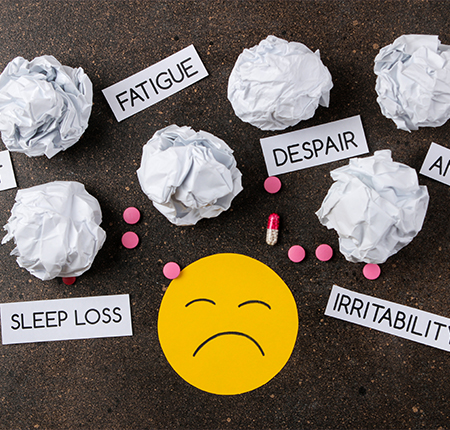
Depending on your lifestyle, daily stress level and your own preferences, sex drive varies from person to person. And even in the case of the same person, there can be periods when the sexual desire is more intense and periods when the libido is almost non-existent. It's normal, and there is no standard "ideal" frequency to have sex.
There is nothing wrong with having a high sexual appetite and a desire for intimacy motivated by pleasure, connection with a partner, or stress relief. Just as there is nothing wrong with not wanting to have sex anymore - contrary to what we often read on social media, nothing tragic happens if you never have sex. Each person's needs are different, including sexually.
What we must admit, however, is that many studies have already demonstrated how beneficial an active and healthy sex life is, and how positively it affects us both physically and psychologically. And when we experience periods of long-term abstinence, the consequences can be felt on all levels.
There is nothing taboo: sexual function is a normal body function that is part of every woman's life, and about which you deserve to be informed. Below we tell you what the negative effects of abstinence can be and why, so that you know both the positive and the less positive consequences.
What effects does lack of sex have on the body?
Just as it's perfectly normal to have an active sex life, it's just as natural to sometimes have a low libido or need to cut down on the frequency of sex.
We can face the lack of sex in our lives either because we are not in a relationship, because we have a busy and stressful time (at the office, in the postpartum period, etc.), because we are directed to abstinence during treatment for a transmitted infection sexual or simply as a personal preference - all are normal situations.
In the long term, however, the lack of intimacy can cause certain changes in our body, in the form of negative effects. It's nothing serious and it doesn't mean we can't live a peaceful life without sex, but there are consequences that can affect us on all levels: physically, psychologically and emotionally.
Let's talk about the main such effects and why they happen.

The heart doesn't work as well because of the lack of sex
Okay, maybe it's a little dramatic to say that your heart isn't working well because you're not having sex. It's unlikely that you'll notice huge differences just because you haven't had an active sex life for a long time (even years at a time).
What we actually want to emphasize is that yes, it has been confirmed that an active sex life has benefits including on the cardiovascular system. Lowering blood pressure, stress and the risk of cardiovascular accidents are all benefits that support heart health when you have regular sex.
We say that the heart no longer works as well only because these benefits disappear in the absence of sexual activity. But surely an active lifestyle with an exercise program and a balanced diet will matter at least as much for the health and optimal functioning of your heart.
Sexual abstinence causes a decrease in immunity
You might not know, but regular sex can support your immune system. Studies have also been done that have confirmed that people who have sex twice a week have a higher level of immunoglobulin A (a type of antibody), which helps the body fight various colds and diseases.
So sexual abstinence can lead to a decrease in the number of these antibodies in the body and, consequently, to a weakened immune system, more prone to colds and flu.
Sexual abstinence can cause prostate problems
Opinions are mixed and research results are divided, but some link has been found between frequency of sexual activity and prostate cancer risk in men.
In a 2016 study of 30,000 men, a lower risk of prostate problems and cancer was seen in those who reported ejaculating more than 21 times in a month.
Vaginal health can be affected due to lack of sex
We are talking here especially about menopausal women, who have a high risk of vaginal dryness and irritation.
You can use lubricants, moisturizers, and estrogen treatments as recommended by your doctor, but one of the best ways to maintain the elasticity of your vaginal tissue and prevent dryness is through sex.
In the absence of regular sexual activity, the vagina can change at menopause, becoming more rigid, with thinned tissues. This increases the risk of injury, bleeding and discomfort when you finally have sex, starting a vicious cycle.
Because of the discomfort, you avoid intimate contact even more, and abstinence only increases the discomfort and increases the sensitivity in the vagina.
Lack of sex reduces the risk of urinary infections
Here's one positive thing: less sexual contact means less risk of contracting urinary or sexually transmitted infections.
In other words, one of the most common causes of urinary infections is the fact that bacteria transmitted from the partner during sexual contact, seminal fluid or even the condom or contraceptive method used, can irritate the inside of the vagina and disturb the vaginal flora. This creates an imbalance and a vulnerability to infections.
When these factors are eliminated through sexual abstinence, the risk of this type of urinary tract infection decreases.
However, the rules of hygiene remain valid and so does the need to take care of everything that comes into contact with your body, from clothes and underwear to menstrual and intimate hygiene products. Because the causes of urinary infections are very varied and just the lack of sex does not guarantee your vaginal health. We've talked a lot more about UTIs, their causes and symptoms on the Enroush blog, and we invite you to read that article as well if you want to know more details.
Lack of sex can increase anxiety levels
We also come to the effects that appear on a psycho-emotional level, and anxiety and stress are the first and immediate consequence of the lack of sex. But before we talk about the negative effects on mental health, take a look at our article HERE , where we explained in your understanding what anxiety is and how it manifests itself.
During intimate contact and orgasm, the body releases oxytocin, serotonin and dopamine. These hormones help you reduce your stress levels and decrease anxiety.
When withdrawal sets in and the production of these hormones decreases, anxiety and stress levels are likely to increase, especially if you used to use sex as a coping mechanism (managing difficult/stressful situations).
Abstinence from sex can make menstrual cramps worse
Did you know that in surveys and research, many women have confirmed that sex during their period reduces menstrual cramps as (or almost as) effectively as ibuprofen?
Both the relaxation that occurs with the help of endorphins released during sex, and the fact that the blood circulation is improved, leads to a decrease in abdominal pain when you have sex during your period. And when you don't, menstrual cramps can get worse.
However, not all women have a sexual partner or the disposition to have sex at that time of the month, and it's good to know that there are other natural ways to relieve menstrual cramps without pills. If you haven't tried them yet, Enroush Menstrual Patches are made with 100% natural, biodegradable ingredients that heat up on contact with air and oxygenate the uterine muscles, giving you up to 8 hours of period pain-free peace through heat therapy.

Couple life is affected due to lack of sex
Of course, another aspect directly and immediately affected by the lack of sex is the relationship with the partner.
Intimate contact is an important element in married life through which partners communicate, get closer, strengthen their connection. When this contact disappears, you may no longer feel as emotionally connected to your partner, communication problems may arise, and the level of happiness and satisfaction in the relationship may decrease.
Try to maintain a close connection during abstinence and open communication so that you don't allow the physical distance to have such a strong impact on your bond.
In addition, the lack of sex does not mean the total lack of physical contact. Hugging, kissing, touching, gestures of affection, and openness to your partner can maintain connection in your relationship even without sex.
Lack of sex affects libido
Sometimes low libido is the cause and lack of sex is the consequence. We talked openly about these situations in another blog article, where we explain what you need to know about what doesn't excite you .
But there are also cases when the situation is the other way around, namely the lack of sex is the cause that leads to an even more drastic decrease in sexual desire.
In other words, you know how people say that "appetite comes with eating"? The same goes for intimate contact. The more regularly you have sex, the more likely you are to want it. The more sex is absent from your life and is no longer associated with the feeling of pleasure, the more the desire for sex decreases.
The benefits of sex on the body
So far we have talked about the main negative effects, but among them we have already mentioned some of the most important benefits of sex on the body.
As I said at the beginning, sexual function is also part of a healthy life, and regular sexual activity offers you multiple benefits in physical and psycho-emotional terms, including:
Better functioning of the cardiovascular system
Memory improvement
Reduction of menstrual and menopause symptoms
Strengthening the immune system
Improving the relationship with the partner
Reducing anxiety and stress
Increasing sleep quality
Immediate and rapid pain relief
Increased libido
Many of these benefits disappear or are significantly reduced with sexual abstinence, but that doesn't mean it's the end of the world. Also read our article on how to create intimacy without sex for those times in your life when sexual contact is contraindicated or out of reach. You might be surprised at how many other ways there are to express your affection to your partner, maintain the connection as a couple, and enjoy the psychological benefits of sex without sex.
Reasons why someone might stop having sex
There are many reasons why a person can enter a period of sexual abstinence, starting from their own desire and ending with situations of need (eg: on the doctor's recommendation).
You don't need any reason to justify your personal choices, and whether or not you want to have an active sex life is entirely up to you. But here are some of the most common reasons why some people choose or have to stop having sex:
Asexuality
Decreased libido
The desire to reset the sex life
Avoiding anxiety when sex creates it
Need time to process and manage negative emotions related to sex
Imposing social or religious norms
Total elimination of any risk of contacting/transmitting a sexually transmitted infection
Frequently asked questions about lack of sex
We hope that with this article we have answered as many questions as possible related to the negative effects of the lack of sex, but also to the benefits of an active sex life.
In the end, we know that there are always some key questions that you need a succinct answer to, so we try to give you exactly the answers you're looking for in this section.
What are the adverse effects of sexual abstinence?
They are not really adverse effects, in the sense that these consequences are not serious and do not affect your life or health to such a significant extent. Something bad doesn't happen just because you give up sex. But in short, the main problem with sexual abstinence is that the benefits that an active sex life gives you disappear or are reduced.
In this context we can say that the cardiovascular system no longer works as well, the immune system decreases, stress and anxiety levels increase, sleep quality and libido decrease and the relationship with the partner is affected. Keep in mind that these are all just possibilities, and the lack of sex doesn't affect everyone the same.
How does lack of sex affect a woman?
In women, lack of sex can worsen PMS symptoms and menstrual cramps. And in the case of menopausal women, sexual abstinence can worsen vaginal dryness and the discomfort created by thinning vaginal tissue. Conversely, a positive effect is that it lowers both the risk of sexually transmitted infections and the risk of urinary tract infections.
What are the adverse effects of lack of sex on mental health?
Because the release of oxytocin and endorphins during sex is reduced, abstinence can worsen depression and anxiety. It can also lead to less effective stress management and lower quality of rest, especially when intimate contact is used as a release method.
What are the adverse effects of sexual abstinence on relationships?
Because sex is a way of connecting and communicating between partners, the lack of sexual contact can create gaps in communication, the feeling of distance and coldness, or the loss of connection as a couple. It is important to continue to create intimacy without sex, talk about your feelings and express your affection through non-sexual physical gestures (tender touches, hugs, etc.) to avoid such negative effects.

What are the benefits of not having sex?
Sexual abstinence also has certain benefits, the most important of which is reducing the risk of transmitting/contacting sexually transmitted diseases to 0%. Other benefits include reducing the risk of urinary tract infections, reducing anxiety from sexual contact, or being available to reset your sex life and manage negative emotions about sex.






















